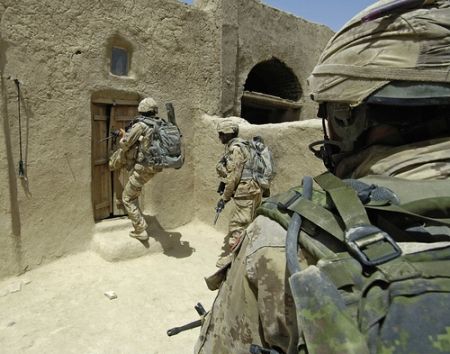Canadian Military and 2010 Security
Military seeks low profile for Games
Canadian Forces were formally authorized in June 2006 to begin assisting the RCMP with Olympic planning
David Akin
Canwest News Service
The Vancouver Sun, Wednesday, May 21, 2008
OTTAWA -- Canadian security agencies are planning to use planes, tanks, ships, and thousands of military and police personnel to secure the Vancouver 2010 Olympic Games and will consider their job a success if the public hardly notices their presence.
"It must be understood that the V2010 Games are a sporting event, not a security one," wrote Chief of Defence Staff Gen. Rick Hillier in his Initiating Directive, a document prepared in June 2006 that formally authorized the Canadian Forces to begin assisting the RCMP with that agency's Olympic plans.
The directive and other Canadian Forces documents, obtained by Canwest News Service using federal Access to Information laws, indicate the Canadian Forces are taking great pains not to "take over" planning for the Olympics and to ensure that during the event, which is expected to attract hundreds of thousands of visitors to Vancouver, Canadian Forces personnel and equipment will be visible only during ceremonial events.
Military planners say it will be the largest security operation in Canadian history and, if they do it right, Canadians will hardly notice.
"CF support to this aspect of the V2010 Games will need to be discrete to the general public. CF ceremonial support to [the federal government] will
be in the public eye to the extent desired by the [government]," Hillier wrote. "In both cases, it must be understood that the CF shall remain in a
supporting role and at no time should staff at any levels attempt to take the lead."
Security agencies believe they will be able to stay out of sight by using an array of surveillance technologies, including closed-circuit cameras,
electronic sensors, and unmanned aerial vehicles flying high over the Olympic venues in Vancouver and Whistler. In fact, one researcher, sociologist David Lyon of Queen's University, has dubbed Vancouver 2010 "the Surveillance Games." Lyon, the director of The Surveillance Project, a research initiative partly funded with a $2.5-million federal government grant, plans to organize an academic conference on that theme in Vancouver
just ahead of the 2010 Games.
A discrete and quiet role would be a marked contrast to approaches taken by the CF and police forces to secure other high-profile events.
For example, at the 2007 summit in Montebello, Que., where Prime Minister Stephen Harper hosted meetings with U.S. President George Bush and Mexican President Felipe Calderon, police in riot gear backed up by camouflaged Canadian Forces soldiers patrolled the area around the meeting site. Canadian Forces helicopters, with armed soldiers hanging out the sides, deterred canoes and motorboats along the Ottawa River.
Armed soldiers and helicopters will be present in Vancouver, but military and police planners are hopeful of keeping them in the background. Nearly
13,000 RCMP, military and other security personnel are expected in Vancouver as part of the 2010 security effort.
The RCMP is also planning to install hundreds of cameras throughout the Olympic venues each of which will use face-recognition technology to help
officers keep tabs on the nearly half-a-million visitors expected in Vancouver for the Games.
Hillier, in his initializing orders, said the CF has two goals for Vancouver: Secure the Games and do so while upholding the Olympic spirit.
"Forces and other dangerous individuals or organizations may seize this moment to further their aims using violence," Hillier wrote. "Canadian security forces, and the CF, must therefore be poised to detect, deter, prevent, pre-empt and defeat threats and aggression during the period of the 2010 Vancouver Olympics while respecting, as much as possible, the spirit of the Olympic Truce."
The documents also indicate military planners will use the Vancouver Olympics as a template for securing other events in Canada, such as meetings of the G8 leaders or future sporting events.
Security agencies, led and co-ordinated by the RCMP, are planning to be able to secure the 2010 Games against a number of threats, including
natural disasters, terrorists, crime activity, cyber-threats to the information systems and protests.
"There are a number of terrorist groups that maintain a presence within Canada," Lt.-Gen. Marc Dumais wrote in a planning guidance directive
issued on Oct. 26, 2006. "While much of their activity is related to fundraising, some of these groups are assessed as having the capacity to
undertake terrorist acts."
Dumais is the Commander of Canada Command, one of the four operational divisions of the Canadian Forces. Canada Command is responsible for all
routine and emergency military operations within Canada.
"The V2010 Games could offer opportunities for terrorists -- international and domestic -- and extremists to further their agendas at a high profile event either against Canada or another participating nation(s). Aside from a direct attack on a Canadian target, potentially the greatest impact on Canada would be a terrorist attack directed against the Western interests at the V2010 Games," Dumais wrote.
© The Vancouver Sun 2008
